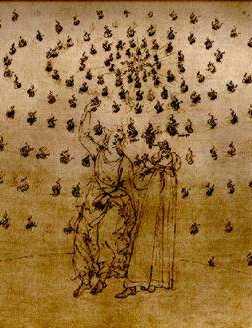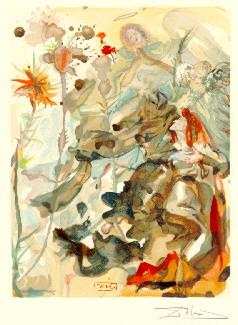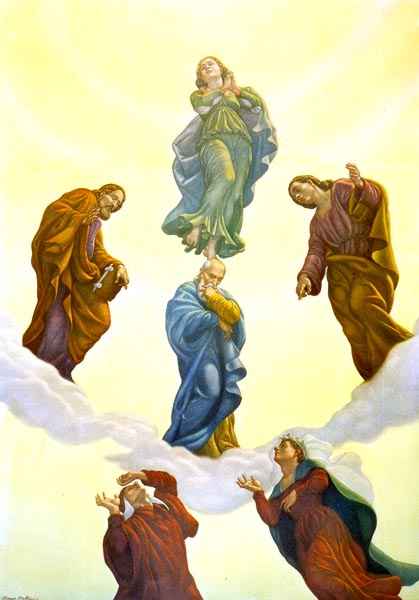 |
 |
 |
|
|
|
|
 |
 |
 |
|
|
|
|
| PAR25 |
|
|
|
|
| ........... | ....... G.GUAITA |
................................. H.W.LONGFELLOW |
...... .D.ALIGHIERI |
....... ... | ....... |
| 1
|
Se
'n
dì
vnirà
che
'l mè puéma sàcru, andùa bütà l'ha i man e cél e tèra, e che l'è fàmi par tànti àni màgar, |
If
e'er it happen that the Poem Sacred, To which both heaven and earth have set their hand, So that it many a year hath made me lean, O'ercome the
cruelty that
bars me out With other voice
forthwith,
with other fleece |
Se
mai
continga
che
'l poema sacro al quale ha posto mano e cielo e terra, sì che m'ha fatto per molti anni macro, |
| 4
|
vìnsa
la
crüdeltà
che
'm
sèra fòra dal bèl a stàbi 'ndùa mè n agnèl durmìva, nemìs ai lüf che sémp a lü i fan guèra, |
vinca la
crudeltà
che fuor mi serra del bello ovile ov'io dormi' agnello, nimico ai lupi che li danno guerra; |
|
| 7
|
cun
n'àuta
vus
urmàj,
cun
n'àuta làn'a, mi turnarù puéta e 'nsla surs dal mè batézim 'ncurunà i sarù; |
con altra
voce omai,
con altro vello ritornerò poeta, e in sul fonte del mio battesmo prenderò 'l cappello; |
|
| 10
|
parchè
'ntla
Féde
che
fa
cunusüi i ànimi a Dìu, mi là i son entrà; e pö par lé, Piétro 'n cél l'è fàmi fèsta. |
Because
into the Faith that maketh known All souls to God there entered I, and then Peter for her sake thus my brow encircled. Thereafterward
towards us
moved a light And then my Lady,
full of
ecstasy, |
però che ne
la fede, che fa conte l'anime a Dio, quivi intra' io, e poi Pietro per lei sì mi girò la fronte. |
| 13
|
Adès
i
rìva
tacà
nuj
an lüm, surtì dal grup andùa prìma l'éra cul che 'd Crìstu l'è stàta 'l prim vicàri: |
Indi si
mosse un
lume verso noi di quella spera ond'uscì la primizia che lasciò Cristo d'i vicari suoi; |
|
| 16
|
e
la
mè
dòna
pién'a
'd cuntantësa, 'm dis:"Vàrda, vàrda: chi iè 'l baròn che ià la sepultüra là 'n Galìsia". |
e la mia
donna, piena
di letizia, mi disse: «Mira, mira: ecco il barone per cui là giù si vicita Galizia». |
|
| 19
|
Mè
vdùma
'n
quàj
culòb
fèsi tant vzìn'a an so cumpàgn, e iün al mùstra a l'àut, la so afesiòn girànd e murmurànd, |
In
the same way as, when a dove alights Near his companion, both of them pour forth, Circling about and murmuring, their affection, So one beheld I
by the other
grand But when their
gratulations
were complete, |
Sì
come quando
il colombo si pone presso al compagno, l'uno a l'altro pande, girando e mormorando, l'affezione; |
| 22
|
cuzì
iù
vist
là
sü
che iün da l'àut prìncip gluriùs a l'éra ricevü', al nütrimént ludànd che la sü 's god. |
così vid'io
l'un da l'altro grande principe glorioso essere accolto, laudando il cibo che là sù li prande. |
|
| 25
|
Ma
quànd
cul
fèsi
fèsta
l'è finì, 'n silénsiu 'coram me', ugnün as fèrma, mè na fiàma splendént che pìa la vìsta. |
Ma poi
che 'l gratular
si fu assolto, tacito coram me ciascun s'affisse, ignito sì che vincea 'l mio volto. |
|
| 28
|
Alùra
Beatrìs
la
dis
ridénd: "O gluriùza lùce che t'è scrivì dla liberalità dla nòsa régia, |
Smiling
thereafterwards, said Beatrice: "Illustrious life, by whom the benefactions Of our Basilica have been described, Make Hope resound
within
this altitude; "Lift up thy
head, and make
thyself assured; |
Ridendo
allora Beatrice
disse: «Inclita vita per cui la larghezza de la nostra basilica si scrisse, |
| 31
|
fa
che
laudà
da
chi,
sia la sperànsa: ti 't sè che tànti vòlti tlu figüri, quànd che Gesü' ai trè pü afèt ai mùstra". |
fa
risonar la spene
in questa altezza: tu sai, che tante fiate la figuri, quante Iesù ai tre fé più carezza». |
|
| 34
|
"Ausa
la
tèsta
e
pìa
sicürësa che lònche vén chi sü dal mond murtàl, cunvén che nòsa lùce lu madüra". |
«Leva la testa
e fa che t'assicuri: che ciò che vien qua sù del mortal mondo, convien ch'ai nostri raggi si maturi». |
|
| 37
|
As
cunfòrt
chi
l'ha
dàmi
'l secònd föc; 'lùra vèrs i duj sant iù ausà i öc' che prìma a 'l gran splendùr iàva zbasà. |
This
comfort came to me from the second fire; Wherefore mine eyes I lifted to the hills, Which bent them down before with too great weight. "Since, through
his grace,
our Emperor wills that thou So that, the
truth beholden
of this court, |
Questo
conforto del
foco secondo mi venne; ond'io levai li occhi a' monti che li 'ncurvaron pria col troppo pondo. |
| 40
|
"Dal
mumént
che
par
gràsia,
prìma 'd mòri al nos imperatùr t' ancòntri antl'àula, la pü segréta ansèma tüti i cunt, |
«Poi che per
grazia vuol che tu t'affronti lo nostro Imperadore, anzi la morte, ne l'aula più secreta co' suoi conti, |
|
| 43
|
sì
che
dop
vist
al
vér di sa curt chi, dla sperànsa che giü bén inamùra, ai àuti e a ti a t'àbii a dè 'l cunfòrt, |
sì
che, veduto
il ver di questa corte, la spene, che là giù bene innamora, in te e in altrui di ciò conforte, |
|
| 46
|
ti
dìmi
lònche
l'è
e
mè fiurìs 'ntla to mént e da 'ndùa a ti l'è vnìti". Cuzì l'ha dìmi ancùra al secònd lüm. |
Say
what it is, and how is flowering with it Thy mind, and say from whence it came to thee." Thus did the second light again continue. And the
Compassionate, who
piloted "No child
whatever the Church
Militant |
di' quel
ch'ell'è,
di' come se ne 'nfiora la mente tua, e dì onde a te venne». Così seguì 'l secondo lume ancora. |
| 49
|
E
la
dòna
che
i
piümi l' ha guidà di me pòvri àli mìi a 'n vol tant àut, 'ntla rispòsta cuzì l'ha prevenìmi: |
E quella
pia che
guidò le penne de le mie ali a così alto volo, a la risposta così mi prevenne: |
|
| 52
|
"N
àut
mè
l'è
lü
la Céza militànt ià nén cun pü sperànsa, mè 'ntal Sul che sa famìja ilümina l'è scrit: |
«La
Chiesa
militante alcun figliuolo non ha con più speranza, com'è scritto nel Sol che raggia tutto nostro stuolo: |
|
| 55
|
par
cust
iàn
parmetìi
che
d'Egìt vnéisa a Gerüzalèm parchè lu vëda prìma che l'àbia 'd militè finì. |
Therefore
it is conceded him from Egypt To come into Jerusalem to see, Or ever yet his warfare be completed. The two remaining
points,
that not for knowledge To him I leave;
for hard
he will not find them, |
però li è
conceduto che d'Egitto vegna in Ierusalemme per vedere, anzi che 'l militar li sia prescritto. |
| 58
|
Cui
àuti
duj
punt
che
a lü ién ciamà nén par savéj, ma parchè giü 'l ripòrta ai òmni sa virtü' quànt ti tl'è càra, |
Li altri
due punti,
che non per sapere son dimandati, ma perch'ei rapporti quanto questa virtù t'è in piacere, |
|
| 61
|
iu
las
a
lü,
che
an fond, ién nén difìcii, nanc n'ucaziòn 'd vantèsi; ma 'l rispònda e la gràsia di Dìu che lu iüta". |
a lui
lasc'io, ché
non li saran forti né di iattanza; ed elli a ciò risponda, e la grazia di Dio ciò li comporti». |
|
| 64
|
Mè
na
stüdént
va
près
al prufesùr, bén dispòst sü lònche l'ha preparà, par mustrèi che lònche i ciàma al sa, |
As
a disciple, who his teacher follows, Ready and willing, where he is expert, That his proficiency may be displayed, "Hope," said I,
"is the certain
expectation From many stars
this light
comes unto me; |
Come
discente ch'a
dottor seconda pronto e libente in quel ch'elli è esperto, perché la sua bontà si disasconda, |
| 67
|
"Sperànsa
-
i
dis
-
l'è na spitè sicür la glòria ancù da vnì che la prudüu di Dìu la gràsia e 'l mérit che iün ià. |
«Spene»,
diss'io, «è uno attender certo de la gloria futura, il qual produce grazia divina e precedente merto. |
|
| 70
|
Da
tànti
autùr
am
vén
a mi sa lùce, ma prìma 'd tüti an cör l'ha distilàmlu cul che 'l pü grand cantùr di Dìu l'è stàta. |
Da molte
stelle mi
vien questa luce; ma quei la distillò nel mio cor pria che fu sommo cantor del sommo duce. |
|
| 73
|
'Sperent
in
te',
là
'ntla
so teudìa, 'm ricòrd, al dis 'cuj che i san al to nom'; chi lu sa nén se féde ià mè mi? |
'Sperent
in te,' in the high Theody He sayeth, 'those who know thy name;' and who Knoweth it not, if he my faith possess? Thou didst instil
me, then,
with his instilling While I was
speaking, in
the living bosom |
'Sperino
in te',
ne la sua teodìa dice, 'color che sanno il nome tuo': e chi nol sa, s'elli ha la fede mia? |
| 76
|
Dòpu
da
lü
t'è
ti
'ncülcàmlu 'ndrénta 'ntl' epìstula, ma tant che i son pién, mi i son bon ànche 'nti àuti 'd riversèla". |
Tu mi
stillasti,
con lo stillar suo, ne la pistola poi; sì ch'io son pieno, e in altrui vostra pioggia repluo». |
|
| 79
|
Mi
i
parlàva
e
'ntal
cör dal föc ardént tant ad frequént na fiàma i tarmulàva mè füisa stàta na cuntìnua lòzna. |
Mentr' io
diceva,
dentro al vivo seno di quello incendio tremolava un lampo sùbito e spesso a guisa di baleno. |
|
| 82
|
Pö
'l
dis:"L'amùr
che
ancùra
'ndrén m'infiàma 'd cùla virtü' che près l'è vnìmi sémp fin ch'iù pià la pàlma e surtì dal camp, |
Then
breathed: "The love wherewith I am inflamed Towards the virtue still which followed me Unto the palm and issue of the field, Wills that I
breathe to thee
that thou delight And I: "The
ancient Scriptures
and the new |
Indi
spirò:
«L'amore ond'io avvampo ancor ver' la virtù che mi seguette infin la palma e a l'uscir del campo, |
| 85
|
al
völ
che
i
pàrla
a ti che tl'è tant càra e a mi 'm piazrìa tant che tam dizéisi che l'è che la sperànsa a ti 't prumët". |
vuol
ch'io respiri
a te che ti dilette di lei; ed emmi a grato che tu diche quello che la speranza ti 'mpromette». |
|
| 88
|
"Al
testamént
növ
-
i
dis - e l'antìc i màrcu 'l sëgn e lu mùstru 'nche a mi, di ànimi che Dìu l'è fàsi amìzi. |
E io:
«Le nove
e le scritture antiche pongon lo segno, ed esso lo mi addita, de l'anime che Dio s'ha fatte amiche. |
|
| 91
|
Ogni
ànima
vistìa,(
l'è
Izaìa), antla so 'sità' sarà ad dùpia vèsta e la 'sità' l'è chi, sa nòsa vìta; |
Isaiah
saith, that each one garmented In his own land shall be with twofold garments, And his own land is this delightful life. Thy brother, too,
far more
explicitly, And first, and
near the ending
of these words, |
Dice
Isaia che ciascuna
vestita ne la sua terra fia di doppia vesta: e la sua terra è questa dolce vita; |
| 94
|
e
to
fratel
'n
manéra
'ncù pü ciàra, là 'ndùa 'l dis 'vistìi ién tüti 'd biànc', stèsa rivelasiòn al manifèsta". |
e 'l tuo
fratello
assai vie più digesta, là dove tratta de le bianche stole, questa revelazion ci manifesta». |
|
| 97
|
E
prìma,
dop
finì
si
mè paròli, 'sperent in te' adzùra a nuj as sént; e i dan rispòsta i ànimi cantànd; |
E prima,
appresso
al fin d'este parole, 'Sperent in te' di sopr'a noi s'udì; a che rispuoser tutte le carole. |
|
| 100
|
e
pö
tra
'd
lur
na lùce 's fa tant vìva che na stéila cuzì se 'n Càncru i füisa l'avrìa l'invèrn an méis che l' fa sémp dì. |
Thereafterward
a light among them brightened, So that, if Cancer one such crystal had, Winter would have a month of one sole day. And as uprises,
goes, and
enters the dance Even thus did I
behold the
brightened splendour |
Poscia
tra esse un
lume si schiarì sì che, se 'l Cancro avesse un tal cristallo, l'inverno avrebbe un mese d'un sol dì. |
| 103
|
E
mè
na
fìa
a
s'àusa e l'éntra 'n bal cunténta d'unurè la spùza amìza, mèc par suchì e nén par vanità, |
E come
surge e va
ed entra in ballo vergine lieta, sol per fare onore a la novizia, non per alcun fallo, |
|
| 106
|
cuzì
iù
vist
cul
a
splendùr tant viv vzinèsi ai duj ch' iéru près dansè mè 's cunvenìva a cul amùr ardént. |
così vid'io
lo schiarato splendore venire a' due che si volgieno a nota qual conveniesi al loro ardente amore. |
|
| 109
|
L'è
entrà
'ntal
cant
e
'n cùla dànsa 'n tond; e la mè dòna tüti duj vardàva 'n silénsiu, mè na spùza rispetùza. |
Into
the song and music there it entered; And fixed on them my Lady kept her look, Even as a bride silent and motionless. "This is the one
who lay
upon the breast My Lady thus; but
therefore
none the more |
Misesi
lì
nel canto e ne la rota; e la mia donna in lor tenea l'aspetto, pur come sposa tacita e immota. |
| 112
|
"Cust
l'è
cul
che
la
tèsta l'ha puzà 'nsal cör dal pelicàn, e da 'nsla crus l'è stàta lü sarnì al grand üfìsi". |
«Questi è
colui che giacque sopra 'l petto del nostro pellicano, e questi fue di su la croce al grande officio eletto». |
|
| 115
|
La
mè
dòna
cuzì;
méntre
parlàva i so öc' da cuj trè gavàva nén mè ancù prìma 'd parlè lé l'àva fat. |
La donna
mia così;
né però piùe mosser la vista sua di stare attenta poscia che prima le parole sue. |
|
| 118
|
Mè
cul
che
'l
fìsa
i öc' e mèc sa sfòrsa da vëdi 'l sul che 'n poc al va 'n eclìs, par vuléj vëdi trop al pèrd la vìsta, |
Even
as a man who gazes, and endeavours To see the eclipsing of the sun a little, And who, by seeing, sightless doth become, So I became
before that latest
fire, Earth in the
earth my body
is, and shall be |
Qual
è colui
ch'adocchia e s'argomenta di vedere eclissar lo sole un poco, che, per veder, non vedente diventa; |
| 121
|
cuzì
iù
rastà
mi
fisànd
cul föc, e 'ntant santìva dì:"Parchè tat fìsi ad vëdi lònche chi as tròva nén? |
tal mi
fec'io a quell'ultimo
foco mentre che detto fu: «Perché t'abbagli per veder cosa che qui non ha loco? |
|
| 124
|
Giü
'n
tèra
l'è
'l
mè corp e là 'l rastrà cun i àuti tüti fin che pàri sìa al nümar che 'ab aeterno' l'è fisà. |
In terra
è
terra il mio corpo, e saragli tanto con li altri, che 'l numero nostro con l'etterno proposito s'agguagli. |
|
| 127
|
'N
corp
e
an
ànima
as tròvu 'n paradìs mèc duj lùci ca ién stàta asünti; e cust 't riferirè antal vos mond". |
With
the two garments in the blessed cloister Are the two lights alone that have ascended: And this shalt thou take back into your world." And at this
utterance the
flaming circle As to escape from
danger
or fatigue |
Con le
due stole
nel beato chiostro son le due luci sole che saliro; e questo apporterai nel mondo vostro». |
| 130
|
Parlànda
lü,
la
dànsa
'd
föc di trè la chìta, e chìta ànche l'armunìa che 'nsèma i fàvu al còro di trè vus; |
A questa
voce l'infiammato
giro si quietò con esso il dolce mischio che si facea nel suon del trino spiro, |
|
| 133
|
mè
quànd
ad
culp,
par
pagüra o fadìga, cui rëm che prìma 'nsl'àqua 's sulevàvu, as pòzu tüti a 'l sübiè dal cap. |
sì come,
per cessar fatica o rischio, li remi, pria ne l'acqua ripercossi, tutti si posano al sonar d'un fischio. |
|
| 136 | Antla
mè
mént
che
türbamént
iù avü', quànd che mi 'm gir par vëdi Beatrìs e s'ciarèla i pös nén se bén che iéra |
Ah,
how much in my mind was I disturbed, When I turned round to look on Beatrice, That her I could not see, although I was Close at her side and in the Happy World! |
Ahi
quanto
ne la mente mi commossi, quando mi volsi per veder Beatrice, per non poter veder, benché io fossi |
| 139 | mi pròpi vzìn'a a lé, 'n cul mond beàtu!. | presso di lei, e nel mondo felice! |